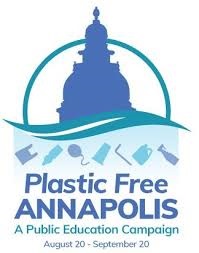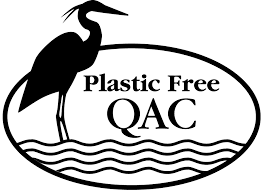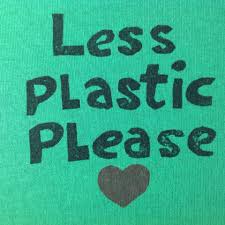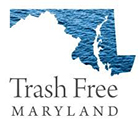The Purge the Plastic campaign, which ended June 1, 2020, asked businesses and organizations in Maryland to share ways they have reduced single-use plastics in the workplace. Names were pulled for a prize drawing and the winners received waste-free items including bamboo utensil sets, and products from fellow members Echotopia and Half Moon Wax Wraps. The winners, Baltimore County Community Tool Bank, Living Word Ambassador Church, The Grooming Place Pet Shop, and Towson University, all shared the creative and unique ways they have approached plastic use reduction in their operations and facilities.
The real prize, course, is the reduction of material waste and litter around your property and beyond; the protection of aquatic life; lower waste collection costs; and the opportunity to serve as a community role model. Thank you to all the organizations who took part in the campaign. We hope you will continue to use the list of practices below to continue to reduce your organization's plastic footprint.
|
What is "problematic and unnecessary" plastic?
- If its use is avoidable or reusable options are available;
- If it’s not recyclable or hampers the recycling process (e.g. the resin type or color is not read by the recycling sorting equipment or hampers the equipment (e.g. plastic bags and cords); or
- It pollutes the environment (e.g. certain resin types degrade into micro plastics which are ingested by aquatic life).
Note that the European Union’s single-use plastics ban, which goes into effect in 2021, includes the following items: cutlery (forks, knives, spoons and chopsticks), plates, straws, stirrers, cotton swabs with plastic stems, sticks for balloons, food and beverage containers made of expanded polystyrene, and all products made of oxo-degradable plastic, which breaks down into microplastics.
|
Here's how to reject, reduce, reuse, replace and redesign
plastic packaging and products in your workplace:
Know Your Plastic Footprint
Set Your Goals
-
Has your organization set a goal (ideally measurable and with deadlines) based on your plastic footprint?
Example:
- Reduce purchasing of single-use plastic by X% by 20XX.
Reject
-
Has your organization eliminated the purchase of any problematic and unnecessary single-use plastic?
Examples:
- Eliminate Expanded Polystyrene (EPS) Foam food packaging.
EPS is non-biodegradable, difficult to recycle, and often ends up in the environment where it breaks into pieces that are easily ingested by wildlife. Note that a number of local jurisdictions in Maryland have already passed polystyrene bans, but on July 1, 2020, a statewide ban will go into effect prohibiting food service businesses, including restaurants, cafes, coffee shops, food trucks and school cafeterias from using most foam products (cups, plates, bowls and clamshell containers).
- Use alternatives to balloons for promotional events and celebrations.
Deflated balloons often end up on land and in bodies of waters where they are mistaken by wildlife for food. If you do use balloons, be sure to use them only indoors and cut the balloons and strings into pieces before disposing. Note that Queen Anne's County has banned the release of nonbiodegradable (latex and Mylar) helium balloons.
Reduce
- Has
your organization taken steps to reduce its use of single-use plastics?
Examples:
- Buy items in bulk and in concentrated form to reduce packaging.
-
Use bulk dispensers instead of individual packets or small containers.
- Purchase products in containers that your supplier can take back.
-
Communicate with your suppliers to let them know you want packaging that is right-sized, and 100% recyclable (no plastic clamshells and foam peanuts).
- In food service and retail settings, ask customers if they need an item rather than automatically providing it (e.g. straws, stirrers, plastic bags).
Note that Montgomery County requires a 5 cent fee on all plastic shopping bags and in Baltimore City, effective 1/31/21, plastic shopping bags will be banned and a 5 cent fee will be imposed on all other shopping bags (paper and compostable).
- Avoid single-use plastic bottles by installing refilling stations, offering pitchers of water and other beverages at company events, and stock vending machines with cans, which have a higher recycling rate.
- Encourage staff to bring their own cups, plates and utensils to meetings and events.
- Offer price incentives to customers that bring their own cups, plates, utensils and take-away food containers.
- Avoid office products (e.g. folders and report covers) made with plastic.
Reuse
- Has your organization replaced disposable plastics with durable reusable items?
Examples:
- Stock your employee breakroom with reusable plates, cups, utensils and serviceware.
- Ask your event caterer to use reusable serviceware.
- Collect and reuse plastic name tag holders.
- If your breakroom has a single-serve coffeemaker, use refillable rather than disposable coffee pods.
Replace
- Has your organization switched to certified compostable items or items made from recycled plastic?
- Buy compostable serviceware certified by the Biodegradable Products Institute (BPI).
Products labeled biodegradable don't always break down readily and typically are not recyclable. When it comes to compostable products, however, you can look for the BPI standard. It's also a good idea to check directly with your composting company to ask about the foodware products they allow. Learn more here about the differences between bio-based, bio-degradable and certified compostable plastics.
- Buy food service items made from plant products (e.g. bagasse. wheat straw, bamboo, wood and paper), which decompose better and faster than compostable plastic.
To calculate costs and savings of switching, use this FoodwareCalculator.
See lists of alternative foodware products developed by Montgomery County and Annapolis Green.
- Use certified compostable bin liners or no liner at all. Remember that recyclables should be kept loose because the liners tangle in the recycling sorting equipment.
- Look for office supplies made from post-consumer recycled plastic (e.g. pens, clipboards).
- Replace any single-use plastic promotional marketing items with items that have a longer useful life, are consumable, or are made from compostable, recyclable materials.
Redesign
- Has your organization redesigned products for durability, recyclability and reusability?
- Design products to be part of a circular material loop by collaborating with your supply chain on the materials you use and with your community and customers on the development of recovery systems that maximize reuse and recycling.
- Offer replacement parts so that items may be repaired.
- Offer take backs so that items can be refurbished and resold.
- Light-weight (reduce) the amount of plastic material used in your products and packaging.
- Design products with resin types that have a strong recyclables market and that can be easily sorted by recycling facilities. Avoid multi-layered plastic types and certain colors that may be rejected by the scanning equipment at sorting facilities.
Educate and Celebrate
- Have you trained and involved staff in your plastic reduction efforts and informed customers of your success?
- Develop a policy on plastic use and procurement.
See sample policies on disposable products.
- Train staff on your policies and proper disposal of items so that they will be able to answer questions from customers.
- Share your efforts with customers through signage on packaging, product dispensers, at the cash register, near trash bins or wherever your clients and customers will see it.
- Do a full phase-out of single-use plastics and celebrate your achievement.
Innovate
- Tell us more about these and other practices your organization has put in place to reduce unnecessary or problematic plastics.
 Plastic Free Annapolis
Plastic Free Annapolis
Annapolis Green and the City of Annapolis teamed up on a month-long public education program called Plastic Free Annapolis in the fall of 2019. Now more than 40 establishments are taking concrete steps to reduce single-use plastics. The program developed a toolkit with information on vendors that supply compostable serviceware, case studies from area businesses, and more, all of which can be found here.
One Montgomery Green
This local nonprofit launched a pilot program in 2019 called
Clean Headwaters (In Search of Plastic). A community-science program designed for students to identify, understand the impacts and explore ideas to reduce, capture and better manage sources of microplastics in local streams.
 Plastic Free QAC
Plastic Free QAC
This Queen Anne's County nonprofit raises awareness on the hazards of single-use plastics and encourages practices like adopting straws-upon-request policies, using plastic alternatives for food serviceware, and recycling boat shrink wrap.
 Less Plastic Please
Less Plastic Please This group is committed to reducing plastic pollution in Howard County and is active on a number of fronts including the passage of legislation to impose a fee on disposable bags. Less Plastic Please is sponsoring a Plastic Reduction Seminar on February 27, 2020, 7 p.m. to 9 p.m. in Columbia, Maryland. Learn more here.
 Trash Free Maryland
Trash Free Maryland
Trash Free Maryland is a nonprofit organization focused on lasting
change to prevent trash pollution and was active in the statewide EPS foam ban.
